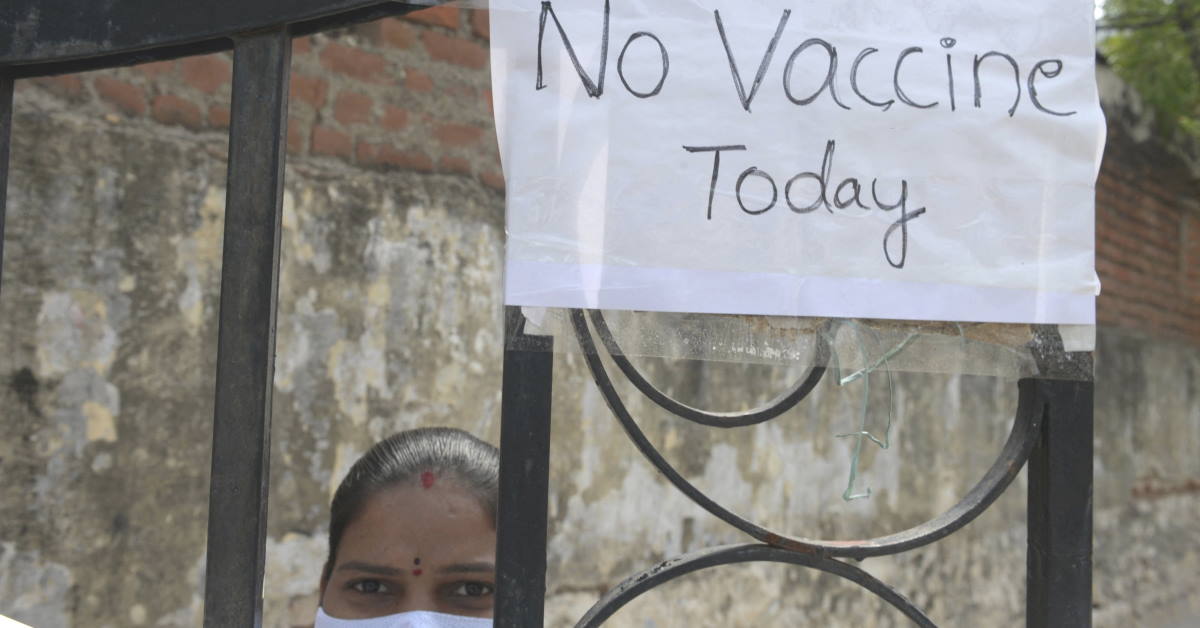The United Nations (UN) on Monday declared the world "at war" against COVID-19, as India's death toll passed 300,000 and Japan opened its first mass vaccination centres.
But just two months ahead of the Tokyo Olympics, the United States (US) on Monday advised its citizens against travelling there.
UN Secretary-General Antonio Guterres urged governments to apply wartime logic to stark inequalities in the response to the pandemic.
Despite rapidly advancing vaccination rollouts in wealthy parts of the world, the crisis was far from over, he warned.
"Unless we act now, we face a situation in which rich countries vaccinate the majority of their people and open their economies, while the virus continues to cause deep suffering by circling and mutating in the poorest countries."
Deadly outbreaks in India, Brazil and elsewhere have pushed the global death toll past 3.4 million people, even as vaccination programmes in rich countries such as the US, Britain and Israel have allowed them to ease restrictions.
India has witnessed horrific scenes in recent weeks with severe shortages of oxygen at hospitals and crematoriums overwhelmed, although the number of new daily infections has fallen in big cities.
But experts say the real numbers of deaths and infections in India – fuelled by a new coronavirus variant and "super spreader" events such as religious festivals – are probably far higher than the official figures.
"We are seeing the bodies along the river Ganges, which don't seem to be recorded as COVID deaths but are very likely to be COVID deaths," Ashoka University biology professor Gautam Menon said.
Japan Ramps Up Vaccination
India has administered close to 200 million vaccine shots, but experts say the programme needs to be ramped up significantly to bring the virus under control.
Another Asian country criticised for its slow inoculation rate is Japan, where the first mass vaccination centres opened on Monday.
"It's wonderful. I can rest easy now," Hideo Ishikawa, 73, told reporters after he got the shot.
Japanese authorities are trying to speed up their vaccination drive with just two months until the postponed Tokyo Olympics begin.
But the US State Department on Monday warned its citizens against travelling there.
The decision was based mainly on government health advice, but also "commercial flight availability, restrictions on US citizen entry", and the difficulty of getting fast COVID test results, the advisory said.
Just two percent of Japan's 125 million population has been fully vaccinated, compared with around 40 percent in the US and 15 percent in France.
Health Workers Pay 'Ultimate Price'
Speaking alongside Guterres at the World Health Organization's (WHO) main annual assembly in Geneva, WHO chief Tedros Adhanom Ghebreyesus said he wanted 10 percent of every country's population vaccinated by September.
He paid tribute to the estimated 115,000 health and care workers who have died from COVID-19 since the beginning of the pandemic.
"They have saved countless lives and fought for others who, despite their best efforts, slipped away," he said. Medical workers lost to the pandemic had paid "the ultimate price in the service of others".
Many medics have felt "frustrated, helpless and unprotected, with a lack of access to personal protective equipment and vaccines", he added.
If the vaccine had been distributed equitably, there would have been enough for all health workers and vulnerable, older people, he argued.
But more than 75 percent of all COVID vaccines have gone to just 10 countries.
Israel's health ministry meanwhile, which has overseen one of the fastest vaccination rollouts, said Sunday that it had proposed lifting all virus restrictions on 1 June, except for travellers arriving from abroad.
Dogs Sniff For COVID
In Saudi Arabia, authorities have tightened the screws on coronavirus vaccine sceptics, barring anyone not vaccinated from pilgrimages, overseas travel and some public spaces.
The rollout remains painfully slow in Brazil, one of the hardest-hit countries in the world, where its far-right president Jair Bolsonaro has been widely condemned for his coronavirus scepticism and pandemic management.
Haiti too, is suffering, the authorities there declaring a week-long state of emergency Monday after detecting two of the more virulent variants of the virus, the ones first identified in Brazil and Britain.
Haiti is one of the last countries still waiting to receive its first doses of the COVID vaccines.
Danish Prime Minister Mette Frederiksen Monday said they would donate three million COVID-19 doses to developing countries this year through the COVAX global sharing scheme. – AFP
